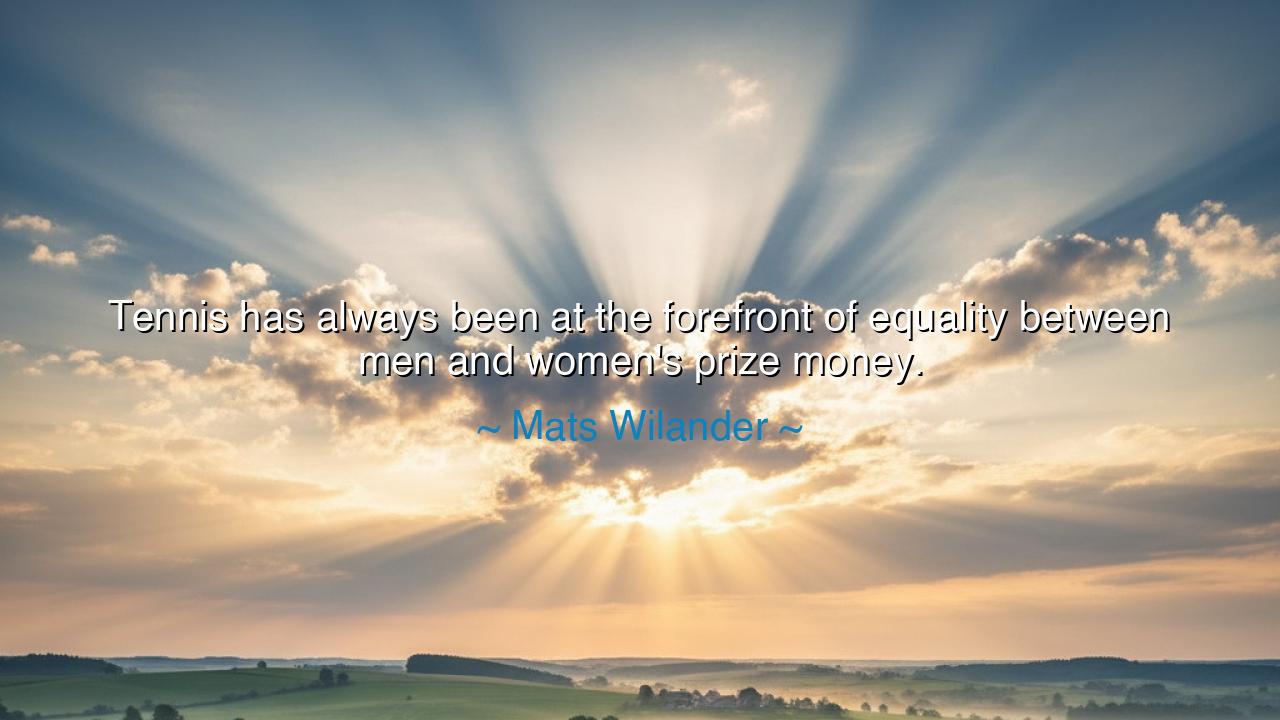
Tennis has always been at the forefront of equality between men
Tennis has always been at the forefront of equality between men and women's prize money.






Hear the voice of Mats Wilander, champion of the courts and philosopher of sport, who once declared: “Tennis has always been at the forefront of equality between men and women’s prize money.” These words, though simple in form, carry the weight of a quiet revolution — the story of a game that became a battlefield for justice, a mirror of society’s long journey toward balance. His statement is not only about the rewards of victory, but about the recognition of worth — that the effort, skill, and spirit of women are no less magnificent than those of men.
In the ancient rhythm of life, there have always been arenas where strength was measured, and through them, humanity learned its values. In the beginning, contests were reserved for men alone, for the world mistook power for dominance and valor for violence. But as ages turned, the human heart began to see that true greatness is not bound by gender. The sport of tennis, graceful yet fierce, became one of the first to lift its gaze toward this truth — that the measure of excellence lies not in the form of the body, but in the fire of the soul.
To understand the roots of Wilander’s words, we must look to a moment in history that shone like a torch through centuries of imbalance. In the year 1973, a woman named Billie Jean King stood before the world and demanded what seemed radical yet was righteous: equal pay for women in tennis. She had battled not only opponents across the net but the weight of tradition and scorn. When the US Open became the first tournament to award equal prize money to men and women, it was not merely a victory in sport — it was the breaking of an ancient chain. From that day, tennis ceased to be just a game of rackets and scores; it became a symbol of fairness, a living testament that equality was not a dream but a decision.
And yet, this triumph did not come without struggle. In the years that followed, women players — from Martina Navratilova to Serena Williams — continued to bear the flame, facing questions not of talent but of worth. They were asked, “Do women deserve the same reward?” As though effort, discipline, and glory could be measured by gender. But the court knows no prejudice. The ball, when struck with precision, does not ask who holds the racket. The roar of the crowd, when moved by greatness, does not distinguish male from female. In this way, the sport itself became a teacher, and its lesson eternal: fairness is the highest form of honor.
Mats Wilander, himself a champion from a golden era, recognized this sacred truth. By saying that tennis stands at the forefront of equality, he was not merely praising a sport — he was affirming a moral order. He was reminding us that institutions, like people, have souls, and that the noblest among them are those who choose justice over comfort. For equality is not a natural gift; it is a human achievement, earned through courage and upheld through vigilance.
In the world beyond tennis, this lesson burns with urgency. Every field — whether of art, science, politics, or labor — has its own court where the match for equality is still being played. The ancient wisdom applies still: honor all who labor, reward all who strive, for the divine spark of greatness is scattered evenly among humankind. To favor one gender over another is to blind oneself to half the light of the world.
Let this teaching, then, be passed to those who come after: be just, not only in law but in spirit. Do not weigh the value of a person by custom or by habit, but by effort, heart, and excellence. Where you see inequality, speak as Billie Jean King spoke, as Mats Wilander affirmed — for silence is surrender, and surrender delays the dawn.
And remember this: when a society rewards all its champions equally, it reveals not only fairness but faith — faith that human potential knows no boundaries. Thus, as the players of tennis stand on equal ground beneath the sun, so too should all of humankind learn to walk — not divided by gender, but united in dignity, passion, and the shared pursuit of glory.






AAdministratorAdministrator
Welcome, honored guests. Please leave a comment, we will respond soon